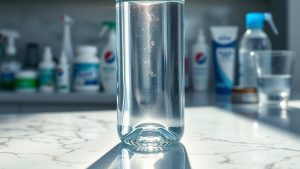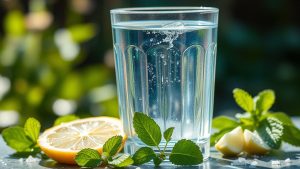
Spring water can have fluoride, but the levels vary widely based on geological factors. On average, fluoride concentration is about 0.08 ppm, generally lower than in municipal tap water, where fluoride is added. Some sources may contain fluoride concentrations ranging from 0.1 to over 4 mg/L, influenced by local minerals. While fluoride aids in reducing cavities, excessive intake can lead to health issues. If you want to understand more about the specifics of your spring water, keep exploring.
While you may choose spring water for its invigorating taste, it's important to understand the role fluoride plays in it. Fluoride occurs naturally in spring water due to the geological conditions surrounding the water source. The fluoride levels can vary notably based on the minerals and rocks the water passes through underground. Some springs may have higher concentrations, while others might contain little to none, making it essential to know the specific source of your spring water.
On average, spring or artesian bottled water contains about 0.08 ppm of fluoride, a level that's generally lower than what you might find in municipal tap water, where fluoride is often added for dental health benefits. Unlike tap water, however, fluoride in spring water isn't typically regulated, which means you can't always trust that the fluoride levels will be consistent. This variability can lead to confusion, especially if you're mindful of your fluoride intake for health reasons.
Spring water typically has about 0.08 ppm of fluoride, often lower than municipal tap water, but its levels can vary significantly.
Different geological formations contribute to these fluctuations in fluoride content. For instance, certain local conditions can influence how much fluoride is dissolved in the water. Depending on the geological characteristics of the area, fluoride concentrations can range from 0.1 to over 4 mg/L. Consequently, if you're particular about your fluoride consumption, understanding the local geology of your chosen spring water source is vital. Natural fluoride in spring water is influenced by the surrounding minerals, which can lead to varying levels of fluoride.
Fluoride in spring water has potential benefits for dental health, as it helps reduce cavities and strengthen tooth enamel. This is why some consumers may opt for spring water, believing it offers a natural source of fluoride without the additives found in tap water. However, you should also be aware of the potential risks associated with excessive fluoride intake. High levels can lead to issues like tooth discoloration or even more serious health concerns, such as cognitive and bone health problems.
Testing fluoride levels in spring water isn't always straightforward due to the lack of regulation. You can use home testing kits or send samples to a laboratory for analysis. Fluoride Ion Selective Electrodes are common analytical techniques for precise measurements, but knowing whether your spring water source has been tested is key to making informed choices. This awareness allows you to navigate the balance between benefiting from fluoride and avoiding its excess.
When comparing spring water to other types, you'll find that mineral water often has higher fluoride levels, around 0.32 ppm, while distilled water usually contains very little fluoride, less than 0.01 ppm. If you're concerned about fluoride, flavor-added waters may have around 0.16 ppm, and fluoride-added bottled waters can contain about 0.63 ppm.
Ultimately, if you're aiming to manage your fluoride intake, it's wise to educate yourself about the specific spring water you're consuming. Understanding its fluoride content can help you align your choices with your health goals, whether you seek the benefits of fluoride or aim to minimize it for wellness reasons.
Conclusion
In summary, knowing whether your spring water contains fluoride is vital for your health. While many people seek the purity of spring water, it's important to be aware of any additives, even if they seem as distant as a rotary phone in today's digital age. Testing your water can help guarantee you're making informed choices. After all, just like a well-connected smartphone, your health deserves the best information at your fingertips. Stay informed, and drink wisely.



